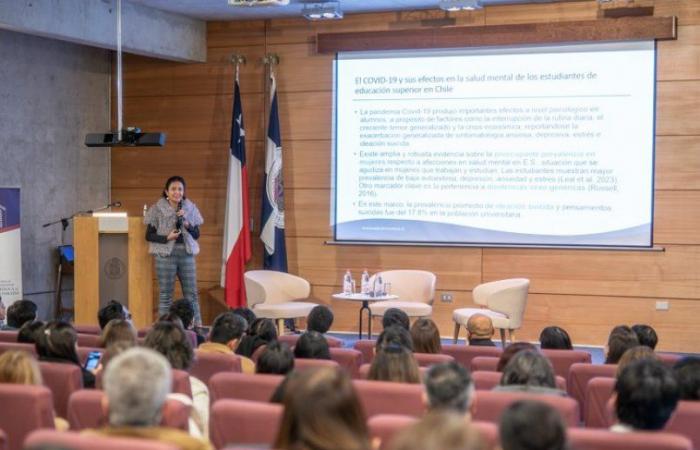The seminar “Mental health challenges in the context of the teaching care relationship” was held at the Curauma Campus of the Pontifical Catholic University of Valparaíso, organized by the Health Commission of the Group of Regional Universities (AUR), an entity that brings together 22 study houses committed to the development of regional communities and territories.
The objective of the activity was to generate a broad analysis, from different perspectives, of the state and current situation of mental health in Chile with a focus on the clinical fields of health centers that receive students studying different careers in that field, and that They must carry out professional practices, internships or internships.
Verónica López, an academic at the School of Psychology at the Pontifical Catholic University of Valparaíso and director of the Center for Research on Inclusive Education at PUCV, explained that “when professionals who work in health areas have to do their professional internship and find themselves in environments that have not changed in the way that university contexts have, where there are policies and protocols against violence, abuse, harassment and bullying, and which have generally made progress in greater curricular flexibility, and they face clinical fields where this has not changed and the relationships are very hierarchical, there is a need to establish clear expectations, clarify roles and identify some students who might be presenting problems.”
In this regard, she stressed that it is not necessary to advance by increasing individual mental health care as the sole purpose, but rather “the quality of learning and work environments must be improved, generating policies for university coexistence and good labor treatment, since it allows us to prevent and identify those situations of students or careers that require more support to advance in a multi-level system,” indicated the academic.
In addition, Claudio Zett, director of the PUCV School of Medical Technology, shared that it is vitally important in all universities in the country to articulate the work of clinical field coordinators or clinical practices.
“There is an administrative structure that is in charge of assigning students to the clinical field, where there are tutors who are committed to the teaching care work and there is direct supervision of a person to accompany the students and know what their emotional situation is every day. every day to help them in a timely manner, however many more resources and tools are required,” said the academic, who also referred to the clinical fields law that seeks to ensure the quality, relevance and coordination of the health benefits offered by the universities with hospitals when filling places for the training of health professionals.
MENTAL HEALTH
Cristian Gálvez López, director of the Valparaíso – San Antonio Health Service, said that “mental health problems in Chile are not new, although they have increased in a post-pandemic context. Health services have initiated a series of actions and analyses to better impact the working and student community, which allows for improved care conditions.”
Along the same lines, the director emphasized the difference that exists between preventive mental health actions in a context of teacher assistance relationships and situations of abuse. “Today our legal system and internal protocols establish complaint mechanisms, both for workers and students, however, promotion and prevention actions are those that we have to develop in the best way and that is why I believe that this meeting contributes to what that we must reach.”
Marcelo Díaz, head of the training and training department of the Viña del Mar – Quillota Health Service, commented that we are facing a challenge that has two components. “We must be able to generate common spaces with universities to form and change cultures.” That is why he highlighted the importance of the so-called Karin Law in a context where “we have to create spaces so that both the student who enters and the professional who supervises him, have the conditions of being in a place where they can focus only on the learning,” he indicated.
It should be noted that this legal initiative seeks to protect both private and public workers in matters of workplace harassment, sexual harassment and violence at work. The new law establishes duties for employers in matters of prevention, investigation and sanction, incorporating a protocol that must have the minimum content provided for in article 211-A of the Labor Code, following the rules established in Circular No. 3813 issued by the Superintendency of Social Security.
Finally, Manuel Bravo Mercado, dean of the Faculty of Sciences of the Pontifical Catholic University of Valparaíso, highlighted the realization of instances of this type that “allow us to know the perceptions, visions and experiences that the different actors have in what for us is part of a formative process. It is evident that knowing


